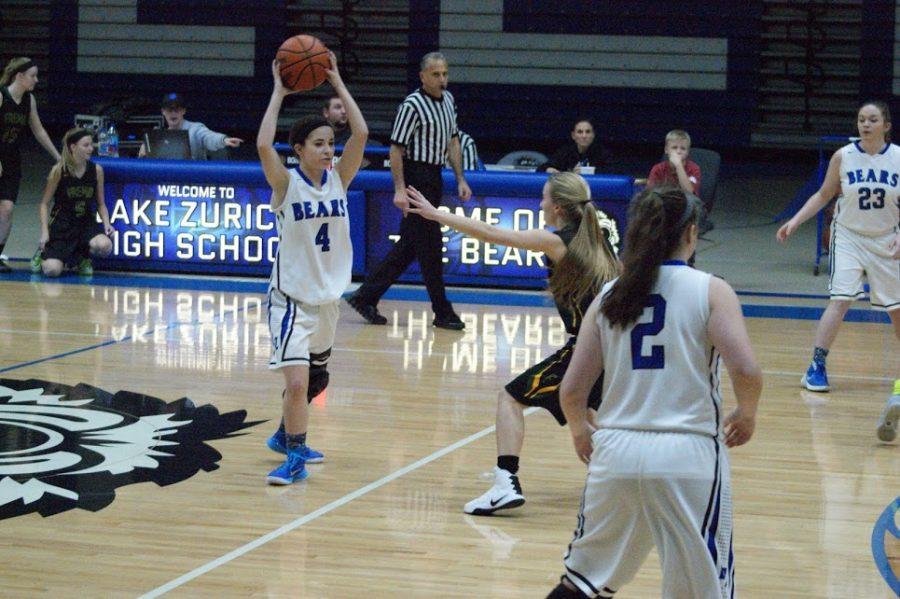Gender inequality in sporting event attendance can be corrected
Photo by Meggie Furlong
Eleni Papastratakos, junior basketball player, looks for a pass in the November 23 game against Fremd. Papastratakos believes that the gender inequality in attendance at high school sporting events can be corrected.
In a world where only 6-8 percent of sports media coverage is of womens’ sports, where male athletes receive $179 million more in athletic scholarships than their female classmates, and where NBA players earn about 70 times more than the average female basketball player makes, the promotion of high school girls’ sports is even more necessary now than ever.
The odds are stacked against female teenage athletes, and by age 17, 51 percent of them will quit sports, according to a survey conducted by Always. When girls drop out of sports, they are missing out on the benefits and opportunities that sports create, according to Eleni Papastratakos, junior basketball and soccer player.
“I probably started playing when I was like two or three. I did every sport possible, like all little kids. Gymnastics, dance, T-ball, soccer, basketball, all of that,” Papastratakos said. “Through sports I’ve been able to make a lot of different friends, which I think has been very beneficial, and it’s been able to open up my eyes to different experiences and I think being in sports helped me become a leader too.”
Sports are a great way for all kids to learn teamwork, goal setting, and hard work, according to Tom Reagan, assistant Athletic Director. Even though sports have many benefits for all players, support from outside of an athlete’s family can differ depending on their gender
“At a boys sporting event, especially football, we get at least half of our student body at the games. For boys’ basketball, there’s a little less than that, but then if you go to any single girls event, you see the parents and maybe three supporting friends of one teammate, and that’s it,” Papastratakos said. “It’s not the cool or fun thing for people to go watch.”
The difference in attendance at girls and boys sporting events at the high school level is also prevalent at the professional level, Reagan said.
“Everyone has the right to watch what they want to watch. [And] a lot of it is a money thing. It’s what people want to watch, it’s not necessarily what’s right, but it’s public driven. It doesn’t make it right,” Reagan said. “Some of it comes down to physical abilities as well. There’s just some things that women’s body types cannot do. Does that make them better? No. It just makes them different.”
In an effort to encourage support for girls’ teams as well as boys, Lake Zurich hosts Pack the Place nights throughout the year that showcase both genders teams.
“We, as a conference, do a boy girl night, or our Pack the Place night. We switch the times up to where it is equal between girls and boys,” Reagan said. “[For] the prime time slot, [or] the main event slot, we are conscious of [which genders’ team gets it] and do discuss at our athletic director meetings. We do want to give equal dates and time slots to both.”
But a way to promote attendance at girls’ sporting events is through the student section, Papastratakos suggests.
“Maybe we could figure it out where at least one leader can get a group of people to come. Maybe one leader to every game,” Papastratakos said. “I think people need to realize that people are taking their time to practice two hours [a day], they’re taking the time to work on something that they love, and it’s good to support our peers with what they like.”
All five male student section leaders declined an interview to discuss how girls sports should be treated equally to boys. However, the athletic department is taking strides towards equality in sports.
“[The] publicizing of games [has helped]. I think we’re doing a better job being visual on social media,” Reagan said. “There are some other things we do want to work with in the future [pertaining towards equality in girls sports]. It is something that is on our minds.”

As a senior, Meggie is the Web Editor-in-Chief of Bear Facts Student Media. Previously, she was the Social Media Manager in charge of the staff Twitter...

